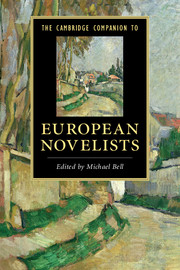Book contents
- Frontmatter
- Introduction: The novel in Europe 1600–1900
- 1 Miguel de Cervantes (1547–1616): Don Quixote: romance and picaresque
- 2 Daniel Defoe (1660–1731): Journalism, myth and verisimilitude
- 3 Samuel Richardson (1689–1761): The epistolary novel
- 4 Henry Fielding (1707–1754): The comic epic in prose
- 5 Jean-Jacques Rousseau (1712–1778): The novel of sensibility
- 6 Laurence Sterne (1713–1768): The fiction of sentiment
- 7 Johann Wolfgang von Goethe (1749–1832): The German Bildungsroman
- 8 Walter Scott (1771–1832): The historical novel
- 9 Stendhal (1783–1842): Romantic irony
- 10 Mary Shelley (1797–1851): The Gothic novel
- 11 Honoré de Balzac (1799–1850): ‘Realism’ and authority
- 12 Charles Dickens (1812–1870): Englishman and European
- 13 George Eliot (1819–1880): Reality and sympathy
- 14 Gustave Flaubert (1821–1880): Realism and aestheticism
- 15 Fyodor Dostoevsky (1821–1881): ‘Fantastic realism’
- 16 Leo Tolstoy (1828–1910): Art and truth
- 17 Émile Zola (1840–1902): Naturalism
- 18 Henry James (1843–1916): Henry James's Europe
- 19 Marcel Proust (1871–1922): A modernist novel of time
- 20 Thomas Mann (1875–1955): Modernism and ideas
- 21 James Joyce (1882–1941): Modernism and language
- 22 Virginia Woolf (1882–1941): Re-forming the novel
- 23 Samuel Beckett (1906–1989): Language, narrative, authority
- 24 Milan Kundera (1929–): The idea of the novel
- Conclusion: The European novel after 1900
- Further reading
- Index
- Cambridge Companions To …
8 - Walter Scott (1771–1832): The historical novel
Published online by Cambridge University Press: 28 September 2012
- Frontmatter
- Introduction: The novel in Europe 1600–1900
- 1 Miguel de Cervantes (1547–1616): Don Quixote: romance and picaresque
- 2 Daniel Defoe (1660–1731): Journalism, myth and verisimilitude
- 3 Samuel Richardson (1689–1761): The epistolary novel
- 4 Henry Fielding (1707–1754): The comic epic in prose
- 5 Jean-Jacques Rousseau (1712–1778): The novel of sensibility
- 6 Laurence Sterne (1713–1768): The fiction of sentiment
- 7 Johann Wolfgang von Goethe (1749–1832): The German Bildungsroman
- 8 Walter Scott (1771–1832): The historical novel
- 9 Stendhal (1783–1842): Romantic irony
- 10 Mary Shelley (1797–1851): The Gothic novel
- 11 Honoré de Balzac (1799–1850): ‘Realism’ and authority
- 12 Charles Dickens (1812–1870): Englishman and European
- 13 George Eliot (1819–1880): Reality and sympathy
- 14 Gustave Flaubert (1821–1880): Realism and aestheticism
- 15 Fyodor Dostoevsky (1821–1881): ‘Fantastic realism’
- 16 Leo Tolstoy (1828–1910): Art and truth
- 17 Émile Zola (1840–1902): Naturalism
- 18 Henry James (1843–1916): Henry James's Europe
- 19 Marcel Proust (1871–1922): A modernist novel of time
- 20 Thomas Mann (1875–1955): Modernism and ideas
- 21 James Joyce (1882–1941): Modernism and language
- 22 Virginia Woolf (1882–1941): Re-forming the novel
- 23 Samuel Beckett (1906–1989): Language, narrative, authority
- 24 Milan Kundera (1929–): The idea of the novel
- Conclusion: The European novel after 1900
- Further reading
- Index
- Cambridge Companions To …
Summary
[I]n the history of prose fiction there are but two epoch makers –Cervantes, who did the ancient and beloved art of pure story-telling to a cruel death, and Walter Scott, who brought it to a glorious resurrection.
Walter Scott raised to the dignity of the philosophy of History the literature which, from age to age, sets perennial gems in the poetic crown of every nation where letters are cultivated. He vivified it with the spirit of the past; he combined drama, dialogue, portrait, scenery, and description; he fused the marvelous with truth – the two elements of the times; and he brought poetry into close contact with the familiarity of the humblest speech.
In the year of his death, Walter Scott envisaged a trip to Greece, returning through Germany to visit the poet Johann Wolfgang von Goethe. It was not to be; Scott's personal travel in Europe was limited to two visits to Paris, a trip to the battlefield of Waterloo and a cruise to the Mediterranean in sadly failing health. But his personal and literary lives were substantially European: in 1797 he married a Frenchwoman, Charlotte Charpentier, and his first literary foray in 1796 involved a translation of two German ballads, prompted by Henry Mackenzie's paper to the Royal Society of Edinburgh on German drama, which Scott remembered described ‘scenes of wildest contrast, and all [the] boundless variety of character mingling, without hesitation, livelier with more serious incidents, and exchanging scenes of tragic distress as they occur in common life, with those of a comic tendency’. Thus liberated from ‘the rules so servilely adhered to by the French school’, the young Scott set about learning German. Translating Goethe's historical play GÖtz von Berlichingen in 1799 consolidated his admiration for the German writer and led indirectly to their correspondence in the 1820s.
- Type
- Chapter
- Information
- The Cambridge Companion to European Novelists , pp. 140 - 158Publisher: Cambridge University PressPrint publication year: 2012
- 1
- Cited by

